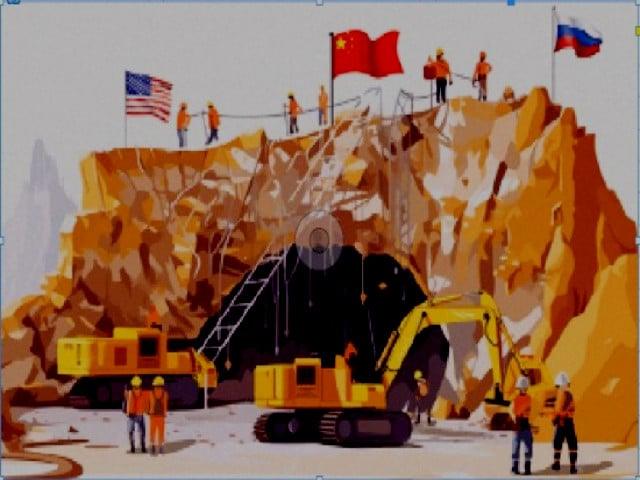Islamabad:
Pakistan has adopted an ‘open hand -made policy’ to award mining contracts on several trillion dollars by providing equal opportunities for global competitors, including the United States (USA), China and Russia.
China and Russia have long been Arch-Rivals in the United States. At present, Pakistan is engaged at the same time with all three countries.
The Petroleum Ministry recently held a webinar with US officials and businesses and offered them joint ventures in mining contracts.
“We offer equal opportunities for Russia, China and the US (USA) to participate in the mining sector,” Petroleum Minister Ali Pervaiz Malik told the media here Thursday.
Pakistan is currently working on the Multibillion-Dollar Recodiq Gold and Mining Project, which will open ways to investments from several countries such as the United States, China and Russia. He noted that Recodiq would be a role model to attract investment in the mining sector.
In response to a question, he excluded discrimination when allocating the mining contract to any country.
“I have been to Russia and offered Russian companies to invest in Pakistan’s mining sector,” he said, adding that any company from these countries can participate in a bid when offered.
In response to another question, he held the previous government responsible for signing the second LNG contract with Qatar.
“If the LNG contract had not been taken, we may not be facing the current situation of breach in the gas sector,” he said, adding that the government would make the decision to revise the LNG agreement with Qatar, which is due in 2026, which keeps the country’s interests in mind.
There is a question of demand and supply in the country regarding LNG, “Malik commented, adding that 300 mmcfd gas supply has been limited due to LNG.
He held the power department responsible for the current circular debt and gas reinforcement questions and said the electricity sector is not prepared to lift the required gas supply.
In addition, the power department had approved the cabinet to reduce the take-and-pay guarantees for LNG, making the electricity sector an important contributor to the problem. Roof and wage guarantees are reduced to 50% from 60%, which has irritated the petroleum department.
The Petroleum Minister stated that there should be a unified Ministry of Energy and the Petroleum Department had to be made on board for any decision relating to the energy sector.
Pakistan is currently facing an excess supply of liquid natural gas (LNG), a situation that is largely attributed to his second long -term agreement with Qatar. This agreement, originally imagined to strengthen energy security, has instead led to an expensive surplus of LNG in the country. The current government is now actively working to balance the nation’s energy needs and tenders.
The minister said the expensive RLNG forced the government to suspend original 300 mmcfd gas production and that it is trying to control supply and demand side.
In response to recently increased fixed gas taxes, Malik said that RS150 billion subsidies for protected gas consumers in addition to RS250 billion RLNG drainage from power to domestic consumers forced the government to increase the fixed fees with the RS200, adding that the system’s gas was still cheaper than LPG. “We are in an International Monetary Fund (IMF) program that wants a zero deficit,” he noted.
In response to a question regarding the waiver of oil and gas from Iran, he said the Minister of Ministers was working to make a decision in this regard.
He also added that Pakistan and Iran have been in arbitration in Paris in Iran-Pakistan (IP) The gas pipeline project, and a ministerial committee looked over the situation after the Iran-US war.
As for an exception to China and India, the minister said they were not in an IMF program while Pakistan is in an IMF program. “That’s why we need to be careful about whether we should take an exception or not,” noted Malik and added “We can’t go to standard.”
About oil import from Iran, he said the country is still facing restrictions from the United States. “The Committee of Ministers must make a decision on this,” he added.
By meeting the upgrade of refinery, he claimed that the demands of refinery were eligible and SKAT is exempt from their output and that their margins have been regulated. “This is against the basic principle,” Malik noted, adding that unnecessary burden should not be put on the refineries if the government wants them to invest $ 5- $ 6 billion in upgrade projects. He said the question of zero rating was erected with the IMF, which stated that ‘zero-rate’ would not be viable.
The government had exempted VAT in budget 2024-25, which had resulted in losses of RS 34 billion for refineries and the IMF. The government had also committed to the introduction of VAT of up to 5% in the budget 2025-26, but it still had zero rates that annoyed the refineries, which have planned investments of $ 6 billion in the refining sector.
“I’ve tried my best to solve the problems that refineries face and the finance minister has agreed to solve it,” the minister added.
With regard to the oil and investigative sector, he criticized the introduction of a 40% corporate tax on investigative companies that were very high and would harm the government’s indigenization efforts in oil and gas exploration.
In response to a question relating to the admission of the operation of foreign companies in Pakistan, he said a Turkish company had participated in a bid held in April. He also added that the company had also signed an agreement with Oil and Gas Development Company Limited (OGDCL) to make a joint bid for offshore drilling in Pakistan.
About JJVL operations from his LPG plant, he said SSGC was working on it and it would start operations after some time.
On the recent increase in oil prices, Malik clarified that the government had not increased the oil tax on oil products.



